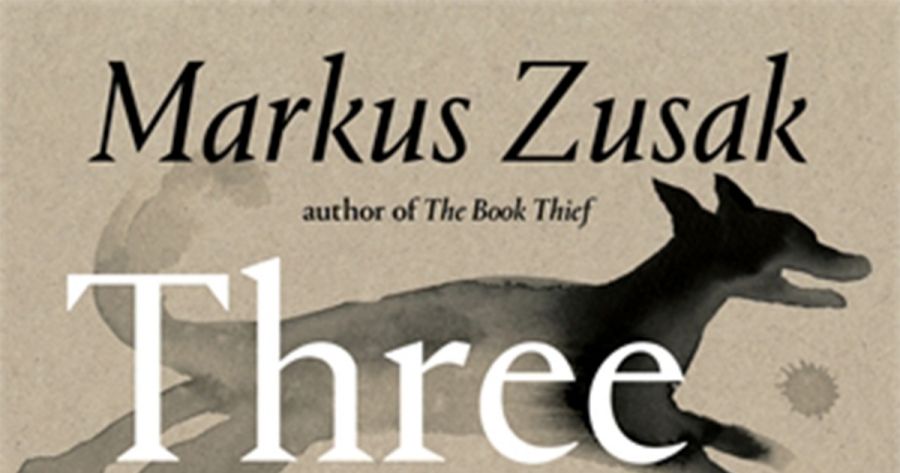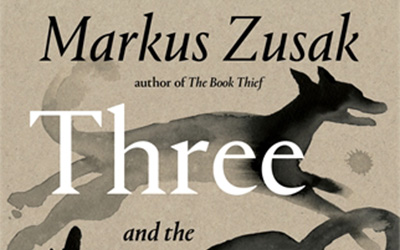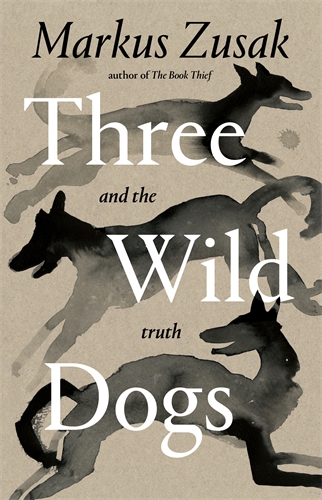
- Free Article: No
- Contents Category: Memoir
- Review Article: Yes
- Article Title: Reuben and Archer
- Article Subtitle: A shaggy-dog story
- Online Only: No
- Custom Highlight Text:
Dogs have long been a feature of Markus Zusak’s fiction. His pre-fame trilogy of Young Adult novels, centring on brothers Cameron and Ruben Wolfe and their family, deployed the animal as a metaphor for tenaciousness. In the trilogy’s final book, When Dogs Cry (2001), Cameron and Ruben all but adopt Miffy, a Pomeranian whose scrappiness matches that of the brothers and whose death provides the book’s emotional fulcrum. There is a caffeinated hound in The Messenger (2002) and a clothesline-obsessed border collie in Bridge of Clay (2018). Even when, as in Zusak’s best-known work, The Book Thief (2006), dogs are not present, something about the way the author sees them – lovably rambunctious, all rough edges, chaos and, yes, doggedness – permeates the spirit of his two-legged characters.
- Featured Image (400px * 250px):

- Alt Tag (Featured Image): Ben Brooker reviews ‘Three Wild Dogs and the Truth’ by Markus Zusak
- Book 1 Title: Three Wild Dogs and the Truth
- Book 1 Biblio: Picador, $36.99 hb, 223 pp
- Book 1 Cover Small (400 x 600):

- Book 1 Cover (800 x 1200):

- Book 1 Readings Link: https://www.readings.com.au/product/9781761561825/three-wild-dogs-and-the-truth--markus-zusak--2024--9781761561825#rac:jokjjzr6ly9m
Following the death of Zusak’s own dog – named Reuben in an unconscious homage to one half of the Wolfe brothers – his wife, Mika, suggests writing about him as a form of catharsis. Zusak tries but falters (‘I couldn’t feel anything’). When Archer, the Zusaks’ other dog, also dies, he begins the task again but finds himself ‘just too broken’. Unsurprisingly for an author who took thirteen years to finish his previous book, Bridge of Clay (2018), agonising over individual words and punctuation marks, Zusak writes:
There were so many starting-off points, to launch a thousand stories – of wild and lawless mornings, and dog day afternoons. [Reuben and Archer had] been in and out of my life, between 2009 and 2021, but for some reason I couldn’t find traction. Maybe there was just too much of them. Too much mass destruction. Too many awkward tragedies. And, of course, too much sheer, unadulterated comedy. After all, what do you get a dog for if not for the chaos itself – to ask anarchy straight to your door?
The opening scene Zusak finally settled on for his first memoir, Three Wild Dogs and the Truth, is a typical scrimmage, albeit one tellingly involving neither Reuben nor Archer but their similarly unruly successor, Frosty – a ‘big, white, boisterous, wiry-furred pound dog’. At a busy intersection in Sydney’s eastern suburbs, Zusak ends up ‘trading blows’ with a biting and headbutting Frosty, pinning him to the footpath in full view of stony-faced onlookers whose dogs – mostly bougie cavoodles – appear entirely under control. ‘There’s a madman dog beside me,’ Zusak writes, ‘and the hounds of memory ahead of us – all in our pages to come. It’s love and beasts and wild mistakes, and regret, but never to change things.’
Novelistic and digressive, the slim Three Wild Dogs is a kind of encomium to the ‘madmen’ dogs to which Zusak and his family are unerringly drawn. Not for them obliging, well-kempt canines of good breeding. Instead, Archer, Reuben, and Frosty – ‘wild, ferocious, temperaments-only-a-mother-could-love pound dogs’, as over-endowed with personality as their thoroughbred counterparts are aesthetically and behaviourally pleasing. ‘Someone has to take the mongrels, the rejected, the unloved,’ explains Zusak. The book is, quite literally, a shaggy-dog story.
First, there is Reuben, advertised as a Great Dane cross Labrador, a ‘big bad brindle thing’. Then there is Archer, or Archie, probably a Labrador cross greyhound, a blond with honey-coloured eyes and legs like a model’s. Chalk and cheese, Felix Ungar and Oscar Madison, but an odd couple with the same challenge to their owners: to get these dogs through their lives without them seriously injuring someone (or, for that matter, themselves – the vet bills are eye-watering).
In this, the Zusaks do not quite succeed. There is the unfortunate piano teacher, Lindi, who requires stitches after being set upon by one or other of the dogs. Then there is Markus himself, knocked unconscious by Reuben in Centennial Park and requiring knee surgery as a result. Such incidents abound in Three Wild Dogs, tales with the flavour of vivid (and perhaps, despite the book’s claim to veracity, embellished) bar-room anecdotes: the brutal dismemberment of a brushtail possum in Centennial Park; the time neighbours reported seeing someone moving a dead body and police were called to the Zusaks’ house (Mika was hauling the declining Reuben up the back steps on a mattress).
Although there is a short digression on vegetarianism (Zusak describes his family ‘lean[ing] steadily towards less meat-eating, and less dairy’ on account of owning animals), for the most part this is a book that actively resists philosophising. There are no sweeping commentaries on the value of human-canine companionship, no Kiplingesque odes to dogs loved and lost. Zusak writes: ‘There’s a tendency to try too hard – to make beauty, to make poetry – when there’s no need to try at all … Best just to tell it simply.’ There is a sense in which Zusak is being disingenuous here – he does write poetically, in tumbling and sometimes florid prose which evinces a love of language as well as a desire to capture life’s effervescences – but he refuses to soften the devastating blow of Reuben’s death with the euphemism ‘passed away’. Likewise, Zusak studiously avoids anthropocentrism, or what he calls ‘the sin of pinning human thoughts onto animals’.
Three Wild Dogs and the Truth is a moving enough portrait of a life lived with beloved, if ungovernable pets, without such conceits. Reuben and Archer, in particular, emerge as complexly drawn anti-heroes the reader can’t help but root for, despite their infelicities. Their deaths, both from cancer, wrench the Zusaks, and us in turn. ‘We take these animals in, often grudgingly,’ Zusak concludes, ‘and all they do is love us (and, you know, all that other terrible stuff, like destroying book deliveries, attacking people, killing other animals, threatening your friends) – but that’s also why they get under our skin. We realise that no-one could love them like we do.’


Comments powered by CComment